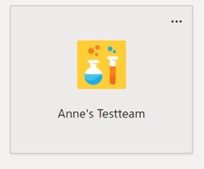Good practices
Online education in times of Corona: Anne van Veen
All teachers from schools and higher education institutions are currently working hard to organize distance education. Anne van Veen, PhD candidate at the Freudenthal Institute, talks about her experiences with online education.
“In period 3, together with Stephen Snelders, Toine Pieters and many guest lecturers, I coordinate and teach the Pharmacy Bachelor’s choice course Addiction and Addictive Drugs, which is open to students of all disciplines. In this course, students learn to look at the phenomenon of addiction from an interdisciplinary perspective. They attend lectures and tutorials, write an essay, take an exam and give two presentations. On Thursday in week 6 of the course, we heard that physical education was discontinued, effective immediately. Fortunately at that time we had just had the last of the lectures, so we did not have to arrange a replacement for that. Since the lectures are given by guest lecturers, I think that would have been quite complicated. We still had to replace: a seminar, research presentation and exam.
The seminar was scheduled for the day after the announcement, so it was canceled. We did, however, come up with an “asynchronous” solution: the students make the reading questions that are normally discussed in the seminar at home and post their answers on Blackboard. We then provided feedback on this.
 The research presentations count towards the final mark and were already scheduled in the following week, so it was important to find an online alternative quickly. I also immediately put a message on Blackboard, so that students would not get stressed about whether or not they could finish the course. TIP: Working online is also new for the students and it is an uncertain period anyway. Take this into account in your communication. For example, after an online exam, put a message on Blackboard that handing in went well for everyone. This is nice to know for the students and also prevents you as a teacher from getting a lot of emails to check this.
The research presentations count towards the final mark and were already scheduled in the following week, so it was important to find an online alternative quickly. I also immediately put a message on Blackboard, so that students would not get stressed about whether or not they could finish the course. TIP: Working online is also new for the students and it is an uncertain period anyway. Take this into account in your communication. For example, after an online exam, put a message on Blackboard that handing in went well for everyone. This is nice to know for the students and also prevents you as a teacher from getting a lot of emails to check this.
During the weekend, like almost all UU lecturers I think, I immersed myself in MS Teams, which I had never worked with before. Fortunately, it turned out to be a fairly simple program. I opened a team with only myself as a member to try out everything without students being able to watch, which is great. TIP: Participate in one meeting with two devices, so you can see on one of the devices what others (would) see, for example when using screen sharing.
We added everyone to Teams and divided them into small groups for the presentations (smaller than the workgroups). On Blackboard I have placed extensive instructions, including the “ether discipline” (for example: microphone off during presentations by others). I was quite excited if everything would go well, unnecessarily as it turned out. The students were well prepared and all online available on time. Even my cat was sitting on my lap for the whole session!
Because these were small groups, the interaction went smoothly. For interaction in larger groups it can be useful to use for example Mentimeter. I tried that recently and I liked it very much.
 We have changed the exam into an open-book take-home exam on Blackboard. Because the exam was an essay exam anyway, we did not have to adjust it. The rest of the course was already via Blackboard, so we didn’t have to change that. Although it was quite a bit of work overall, I think we were lucky with this course, because all parts could be adapted to online education. This is of course much more complicated for courses with practicals.
We have changed the exam into an open-book take-home exam on Blackboard. Because the exam was an essay exam anyway, we did not have to adjust it. The rest of the course was already via Blackboard, so we didn’t have to change that. Although it was quite a bit of work overall, I think we were lucky with this course, because all parts could be adapted to online education. This is of course much more complicated for courses with practicals.
All in all, on the one hand online education wasn’t so bad because the technique and interaction via video worked better and smoother than I expected. On the other hand, I do miss the direct non-verbal feedback in face-to-face education, as opposed to online education.
When the universities open again, I would not use distance learning to replace face-to-face education, but I do see opportunities for additions. For example, have students work together in Teams or catch up on a presentation via a video meeting.
Finally, one last TIP: The UU board has advised to guard against additional performance pressure during this difficult period. I think that’s very important advice if we all want to keep it up. So do not expect yourself and each other to design perfect online courses in a short time. Do what is feasible and help each other. I wish everyone good luck with education in period 4!”
Read also Online education in times of Corona: Ralph Meulenbroeks
Translation: Mark Uwland, Freudenthal Institute

